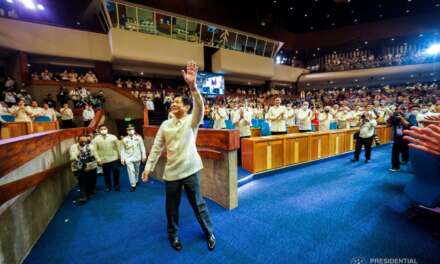The current economic crisis has brought vindication for a small number of Thai farmers (estimated at around one thousand households) linked together in an alternative agriculture network who have been practising integrated and sustainable farming for years. They have emerged practically unscathed while other farmers saw their production costs rising and their credit sources dwindling and those who had deserted farming and flocked into factories are now without jobs.
But why is it that, in the on-going debate on how Thailand is to rise from the current economic ruins, these alternatives, that are being practised successfully at the household and community levels, are consistently misunderstood? They are either misinterpreted (business entrepreneur) to mean new value-added production that could help Thailand compete better in the world or dismissed (economist) as being "all micro and no macro".
The answer can be found in the World Bank report of 1981 cited in Edward Goldsmith ed al (The Case Against the Global Economy, 1996), which claims "subsistence farming is incompatible with the development of the market" even though it admits that "small holders in Africa are outstanding managers of their own resources, their land and capital, fertiliser and water".
Production for ‘the market’ has therefore, then as now, been perceived to be the only means of development and of wealth creation. It has been the reason for the modernisation of agriculture that has created a huge debt burden for farmers and pushed the small holders in the slums. More than that, economists have given the market a great role in determining the value of products being exchanged in the market and therefore completed the monetisation of the local market and its integration into the national and global macroeconomy.
In a recent seminar on "Local Wisdom Pushing through IMF Barriers" organized by the Local Development Institute and several other NGOs and community groups, dozens of local learned farmers took turns to challenge the underlying concepts and values or the ‘mindset’ that chart present development.
The overwhelming crisis as they see it is that everyone in society has been completely fooled. According to Maha Yu, we are fooled by the analysis of the crisis in two ways. Firstly, we are told that our needs can only be satisfied by money. So all of us want money, the more the better, and will go wherever more money is offered. Secondly, we have been given loads of information using tons of paper about what went wrong and what can be done to correct it but none mention the villagers’ experience which can ensure pure air and water, fertile forests, sufficient sunshine and a balanced climate. What is mentioned instead are things that have been and will be detrimental to all these natural resources that we value.
Lung Chali pointed out that, more importantly in fact, we were from the beginning fooled by the principles of economics to allow our forests, minerals and water to be extracted for economic purposes, which meant turning them into money. And it is this kind of money that has accumulated and is now being traded and is wreaking havoc everywhere. To this Pho Prakhong added "How can the rural people not be poor when we do not have our own natural fresh markets left, only their market where we have to use money to get everything we need! Soon we will have to buy even the air we breathe."
Khru Ba Khamdueang believes that if we realise that the values currently held by most villagers and government agencies are mistakes, we can look to our current strengths to pave the way to solving our problems. There are still natural resources which we can protect so that we can have our own markets where we do not need money for transactions. The present problems were caused by the lack of understanding of the outside market not only among the people but also government agencies. We must have noticed that whenever anyone set about to embark upon an income-generation activity, he or she had to start preparing for failure. Competing in the outside market is beyond our skills; it is ‘their’ turf and ‘they’ make the rules. This is true both for rural communities and the country.
Another member was more direct at pointing out the shortcomings of the country’s present bureaucratic, political and educational systems which are being imposed on the people. The government bureaucracy is centralised, operates through a complex of overlapping structures and ultimately is ineffective. The political system is about buying votes and collecting returns on investment plus power buying among politicians. The educational system responds only to the industrial and service sectors and never agriculture. Others added their criticisms of the education system: that it never taught people to think for themselves, only rote learning; that it never gives importance to research and analysis.
Pho That reflected that money is the cause of many changes; most importantly, loss of dignity. But if one takes a closer look, one should be able to see that money is only a make-believe thing. It is paper pretending to be money which pretends to be capital. The real capital which is more important than money is our mental and physical power. Many villagers overlook their own importance, their mental and physical power which they possess without having to borrow or steal from others. We should use these resources more. Many endeavours need patience, perseverance and frugality. Your level of earnings is not important. If you earn 100 baht but spend 105 baht, you are certainly worse off than earning 60 baht with 50 baht expenditure. The Buddha taught us that ultimately we should rely on ourselves so we should never be dependent on others or on their beliefs.
Luang Pho Nan cited another way in which money has come to change people’s values. He believed that unemployment is really not a problem of not finding work but of not getting paid at the determined amount. People seem to perceive problems in the same way as the IMF identifies them as problems. They stick to the minimum wage set by the establishment and will not do work that is offered to them for less than that even though they are guaranteed the security of a place to live and 3 meals a day. How can we make them understand that work is life itself and life is sacred.
All agreed that the way to solve the problems has to begin by not letting ourselves be being fooled by others and by relying on ourselves for our own livelihood.
In this light, the solution to this crisis is very simple, Lung Chiang confirmed: farming. Our way of farming has not harmed anybody nor caused any bankruptcy. What we grow we can eat. What we do helps replenish natural resources. We have to do it a little differently, with more diligence, more time devoted to it and less squandering of our savings. In his opinion, those who are not indebted are already considered rich because they are not tied down by repayment of their debt and the interest.
All others agreed that the solution to the crisis can only arrived at if they pool their wisdom together to help other farmers liberate themselves from the current slave-like mindset and to gain confidence in their own ability to rely on themselves and their own personal and social capital.
Moreover, they need to join together to form groups to produce and exchange goods for their collective livelihood. They would strengthen existing community businesses, such as credit unions, rice banks, cooperative stores, and other services such as herbal treatment as well as gradually build up community industries using locally-existed raw materials, such as rice mills, food-processing, cloth weaving, basketry, organic fertilizer processing. All collective enterprises, however, must not follow the economic mantra of money-making, but to encourage collective learning and cooperation and to guarantee basic social welfare services to all members.
What they would like the government to do is also simple: to change the goal of development from increased GDP to enhanced GDH — Gross Domestic Happiness. The policy measures needed, be they monetary or fiscal, must support the strengthening of community organizations and their learning.
Perhaps the simple truth they pointed out and the simple solution are just too radical for sophisticated minds and that is why these true alternatives will never be taken seriously by both the national and international think-tanks.
* Chanida Chanyapate is a senior associate at Focus on the Global South








